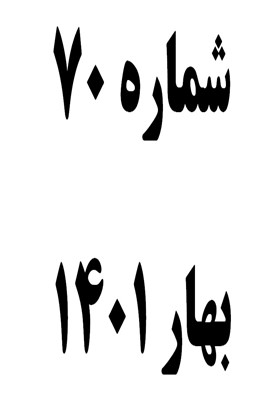ارائه الگوی تربیت معلم کارآمد تراز جمهوری اسلامی
محورهای موضوعی : علوم تربیتی
نرگس یحیائی
1
,
حمیدرضا معتمد
2
,
علیرضا قاسمی زاد
3
![]()
1 - گروه مدیریت آموزشی، واحد کازرون، دانشگاه آزاد اسلامی، کازرون، ایران.
2 - گروه مدیریت آموزشی، واحد کازرون، دانشگاه آزاد اسلامی، کازرون، ایران(نویسنده مسئول)
3 - گروه مدیریت آموزشی، واحد کازرون، دانشگاه آزاد اسلامی، کازرون، ایران..
کلید واژه: اسناد بالادستی, الگوی تربیت معلم, تربیت معلم کارآمد, تراز جمهوری اسلامی,
چکیده مقاله :
بهمنظور بهرهمندی از تعلیم و تربیت با کیفیت، برخورداری از یک الگوی تربیت معلم اثربخش امری ضروری است. هدف پژوهش حاضر، ارائه الگوی تربیت معلم کارآمد تراز جمهوری اسلامی است. روش پژوهش کیفی و از نوع داده بنیاد(گرندد تئوری) است. جامعه آماری پژوهش از میان اساتید صاحبنظر دانشگاه فرهنگیان که در سال تحصیلی 1399-1398 مشغول به تدریس بودند انتخاب گردید . ابزار پژوهش مصاحبه نیمه ساختاریافته و تعداد نمونهها در پژوهش، بر اساس اصل اشباع نظری 21 نفر بود. مدت زمان مصاحبه 30 تا 45 دقیقه در نظر گرفته شد. سؤالات مصاحبه بر اساس اسناد بالادستی تهیه و سپس با استفاده از روش دلفی به رؤیت و ملاحظه صاحب نظران رسید و روایی محتوایی به مدد خبرگان مورد تأیید قرارگرفت، همچنین برای سنجش پایایی آن از ضریب کاپا(میزان توافق بین داوران) استفاده شد. پایایی از طریق باورپذیری، انتقال پذیری، وابستگی و اعتماد پذیری انجام شد. ضریب بدست آمده 87/0 بود که از نظر روان سنجی ضریب قابل قبولی است. مفاهیم استخراج شده از این مصاحبهها شامل 105 کداولیه، 15 طبقه اولیه و سه طبقه (تخصص، تعهد، تحول)که طی سه مرحله کدگذاری باز، محوری و گزینشی در قالب یک الگوی نظری، با محوریت مقولههای اصلی، شرایط علی، شرایط زمینهای، شرایط مداخلهگر، راهبردها و پیامدها منعکس شده است و منجر به طراحی الگوی تربیت معلم تراز جمهوری اسلامی شد.
In order to benefit from quality education, it is essential to have an effective teacher training model. The purpose of this study is to provide a model for efficient teacher training in the Islamic Republic. The research method is qualitative and data-based (grounded theory). The statistical population of the study was selected from the prominent professors of Farhangian University who were teaching in the academic year 2019-2020. The research instrument was a semi-structured interview and the number of samples in the study was 21 based on the principle of theoretical saturation. The duration of the interview was 30 to 45 minutes. Interview questions were prepared based on upstream documents and then used by Delphi method to be seen and considered by experts and content validity was confirmed with the help of experts. Kappa coefficient (the amount of agreement between the judges) was also used to measure its reliability. Reliability was achieved through reliability, transferability, dependency and reliability. The obtained coefficient was 0.87, which is psychologically acceptable coefficient. Concepts extracted from these interviews include 105 categories, 15 basic categories and three categories (expertise, commitment, transformation) that in three stages of open, central and selective coding in the form of a theoretical model, focusing on the main categories, causal conditions, contextual conditions, The conditions of the interventionist, strategies and consequences are reflected and led to the design of a model for teacher training in the Islamic Republic
_||_


